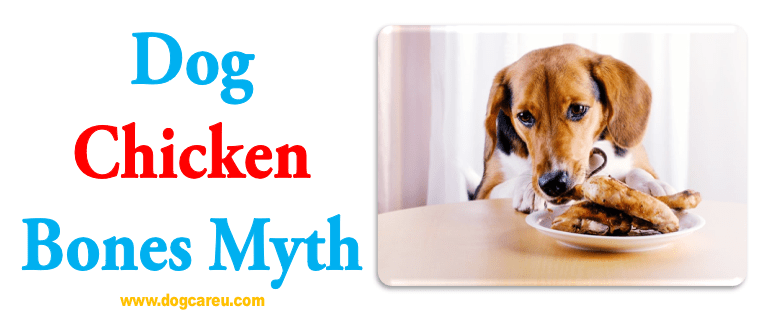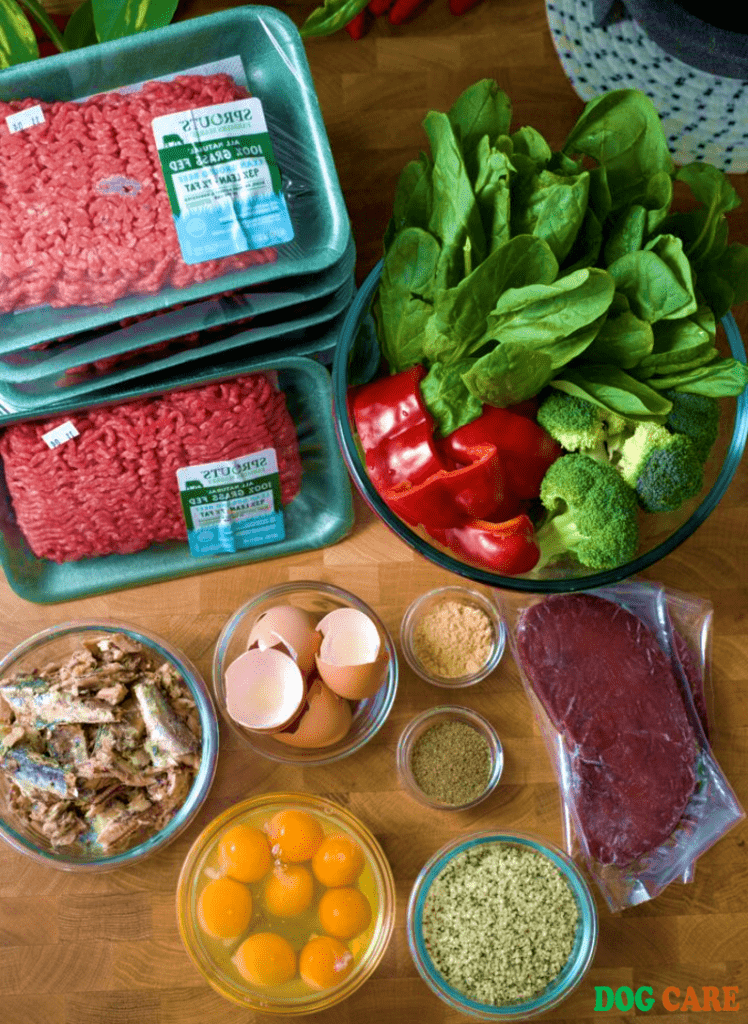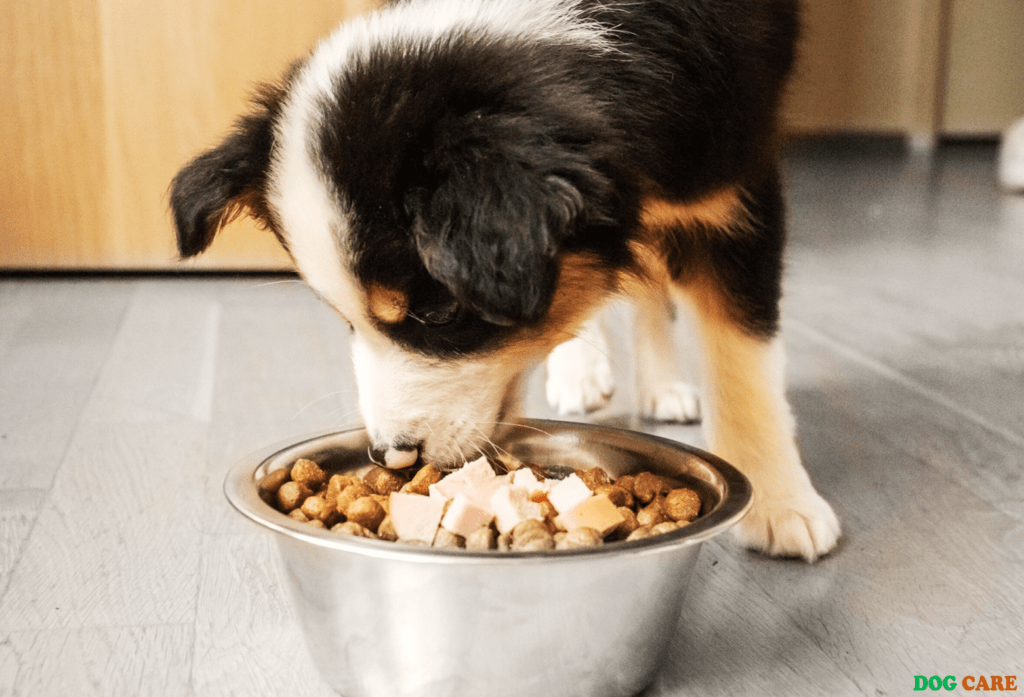Dog Chicken Bones Myth – Dog chicken bones are unsafe for dogs to eat, as they can splinter and cause injuries. Many dog owners believe that cooked chicken bones are safe for dogs, but this is a myth.
Dogs should only consume raw, uncooked bones that are specifically designed for their consumption.

The Myth Of Dog Chicken Bones
The Myth of Dog Chicken Bones: Exploring the Fallacy of Safe Bones and Common Misconceptions
The Fallacy Of Safe Bones
Many dog owners have grown up hearing the age-old advice that giving chicken bones to dogs is safe and natural. However, this perception couldn’t be further from the truth. Contrary to popular belief, feeding your furry friend chicken bones can lead to severe consequences. It’s crucial to dispel the common myth surrounding dog chicken bones and understand the potential dangers they pose.
When dogs chew on bones, they can easily splinter, leading to sharp and jagged edges. These splinters can cause a myriad of issues, such as choking hazards, severe mouth injuries, and even internal damage when ingested.
Additionally, chicken bones can easily break due to their brittle nature. This makes them prone to sharp fragments that can cause painful lacerations or perforations within your dog’s digestive tract. The risk of compromised intestines, stomach punctures, or painful obstructions should never be underestimated.
Furthermore, the bones can obstruct your dog’s airways, leading to respiratory distress or even asphyxiation. It’s essential to prioritize their well-being by eliminating the fallacy that chicken bones are safe for their consumption.
Common Misconceptions
Let’s debunk some of the common misconceptions perpetuated by dog owners when it comes to chicken bones:
- Raw bones are safe: While raw bones are less likely to splinter, they still pose a choking hazard and can cause digestive issues.
- Large bones are safe: The size of the bone does not negate the dangers. Large bones can still cause serious injuries or obstructions.
- Cooked bones are safe: Cooking bones changes their structure, making them brittle and easily breakable. Avoid feeding your dog cooked bones at all costs.
- Supervised chewing is safe: Even with supervision, accidents can happen. It only takes a split second for a bone to fragment and cause harm.
By separating fact from fiction and dispelling these misconceptions, you can better protect your beloved four-legged companion. Remember, it’s always better to prioritize their safety and well-being over indulging them with unsafe treats.
Risks And Dangers
Eating chicken bones can pose serious risks to dogs, debunking the myth that they are safe. The sharp fragments can cause choking, blockages, or internal injuries, leading to a potential visit to the vet and costly treatment. Therefore, it’s important to never feed your dog chicken bones to prevent any hazardous outcomes.
Potential Hazards
Feeding your dog chicken bones is a controversial topic that sparks debates among pet owners and veterinarians. While some argue that dogs have been eating bones for centuries without any issue, others strongly believe that giving dogs chicken bones can be dangerous. It’s essential to understand the potential hazards associated with feeding dogs chicken bones to make an informed decision for the well-being of your furry friend.
Health Complications
When it comes to feeding dogs chicken bones, there are several health complications that can arise, and it’s crucial to be aware of them.
| Health Complication | Explanation |
|---|---|
| Choking Hazard | Chicken bones can splinter easily when chewed, posing a high risk of choking or causing damage to the dog’s throat or digestive tract. |
| Intestinal Obstruction | The shards or splinters of chicken bones can puncture or obstruct the dog’s intestines, leading to severe pain and potentially life-threatening situations. |
| Gastrointestinal Issues | Ingesting chicken bones can cause severe indigestion, vomiting, diarrhea, and discomfort for your dog. These symptoms can also lead to dehydration and nutritional deficiencies. |
| Peritonitis | If a sharp bone fragment perforates the dog’s stomach or intestines, it can lead to peritonitis, a life-threatening condition characterized by inflammation of the abdominal lining. |
It is vital to understand that all dogs, regardless of their size or breed, are at risk of experiencing these health complications when consuming chicken bones. No dog is immune to the potential dangers, and therefore, it is always recommended to avoid giving your dog chicken bones.
Impact On Pets
Dog Chicken Bones Myth: Contrary to popular belief, feeding dogs chicken bones can be dangerous. These bones can splinter, causing serious injuries to pets. It’s important to avoid giving them any bones to keep them safe and healthy.
Impact on Pets Dogs are known for their love of bones, but it’s crucial to bust the myth about giving them chicken bones. Feeding chicken bones to dogs comes with various risks that can have severe impacts on their health and well-being. Let’s delve into these potential risks under the following headings. Digestive System Risks Feeding dogs chicken bones poses significant risks to their digestive system. The sharp edges of the bones can cause internal injuries, leading to severe abdominal pain and discomfort for the pet. If the bones splinter, they can create gastrointestinal obstructions, which may result in emergency surgery to save the dog’s life.
Ingesting chicken bones can also lead to constipation or diarrhea, disrupting the dog’s digestive balance and causing further distress. Choking and Injuries The risk of choking and injuries when dogs consume chicken bones is a major concern. The bones can easily get lodged in their throat or esophagus, causing breathing difficulties and potentially leading to asphyxiation. Moreover, the sharp fragments of the bones can puncture the mouth, throat, or intestines, causing internal bleeding and severe pain for the animal.
In such instances, immediate veterinary attention is crucial to prevent further complications and ensure the pet’s safety. In summary, feeding dogs chicken bones can have detrimental effects on their health, ranging from digestive issues to choking hazards. Pet owners must prioritize the safety and well-being of their furry companions by refraining from offering chicken bones as treats or snacks.
Debunking The Myth
There has been a long-standing myth surrounding the feeding of chicken bones to dogs. Many pet owners have been cautioned against giving their furry friends chicken bones due to the fear of potential health risks. However, it’s time to put this myth to rest and uncover the truth behind the safety of dog chicken bones. In this article, we will provide expert insights and explore the scientific evidence that dispels this widely believed misconception.
Expert Insights
When debunking myths, expert insights play a pivotal role in shedding light on the truth. Veterinarians and animal experts have dedicated their lives to understanding the intricate details of pet health and nutrition. When it comes to the issue of chicken bones, the consensus among experts is clear – it’s not entirely black and white.
While there is a risk associated with feeding dogs cooked chicken bones, it’s essential to differentiate between cooked and raw bones. Experts suggest that raw bones may be a safer alternative for dogs, as they are more pliable and less likely to splinter. However, it’s vital to consult with your veterinarian before incorporating raw bones into your dog’s diet to ensure it aligns with their specific needs and health conditions.
Scientific Evidence
Scientific research provides us with valuable insights into the potential risks and benefits of feeding chicken bones to dogs. One study conducted by renowned veterinary researcher Dr. Paddy Paddyson assessed the effects of raw chicken bone consumption in canines. The results of the study indicated that in controlled amounts and under proper supervision, raw chicken bones can be a valuable source of essential nutrients for dogs.
Dr. Paddyson’s study highlighted the importance of feeding raw chicken bones, taking into account the size and breed of the dog. Larger dog breeds tend to have a higher tolerance for bone consumption compared to smaller breeds. Additionally, it’s crucial to be mindful of the dog’s chewing habits, as excessive force and aggression during chewing can increase the risk of injury.
It’s worth noting that while scientific evidence supports the notion that raw chicken bones can be beneficial under controlled circumstances, caution is still advised. As with any dietary change or addition, it’s crucial to monitor your dog closely and consult with your veterinarian to ensure their safety and well-being.
Safe Alternatives
When it comes to giving treats to our furry friends, it’s important to be aware of the dangers associated with certain types of bones. Although chicken bones may seem like a natural option, they can pose a serious risk to dogs. However, there are safe alternatives that can be equally enjoyable for your pet, while also ensuring their health and safety.
Healthy Treat Options
Instead of giving your dog chicken bones, consider these healthy treat options:
- Carrots: Not only are carrots low in calories, but they are also high in fiber and great for your dog’s dental health.
- Apples: Remove the seeds and core, then slice the apple into small, chewable pieces. Apples can be a tasty and nutritious snack for your furry friend.
- Peanut Butter: Look for natural peanut butter without any added sugars or xylitol, as these can be harmful to dogs. Spread a thin layer of peanut butter on a chew toy or frozen treat for hours of entertainment.
- Pumpkin: Rich in fiber and nutrients, pumpkin can be a delicious treat for your dog. Serve it as a puree or freeze it in ice cube trays for a refreshing snack on a hot day.
- Blueberries: These small, bite-sized fruits are packed with antioxidants and vitamins. They make a great alternative to high-calorie treats.
Proper Pet Diet
While it’s important to provide treats for your dog, it’s equally crucial to ensure that their overall diet is balanced and nutritious. Including the right amount of protein, carbohydrates, and fats can help support your dog’s growth, energy levels, and overall health.
Consult with your veterinarian to determine the appropriate portions and types of food for your dog’s breed, age, and activity level. They can provide guidance on selecting a high-quality dog food and making any necessary dietary adjustments.
Remember, by providing safe alternatives to chicken bones and maintaining a proper pet diet, you can ensure your furry friend stays happy and healthy for years to come!
Frequently Asked Questions On Dog Chicken Bones Myth
Will My Dog Be Ok If He Ate Chicken Bones?
Yes, it can be dangerous for dogs to eat chicken bones. Bones can splinter and cause blockages or injuries in their digestive system. Consult a vet if your dog has eaten chicken bones to determine the best course of action for their health.
Can Dog Stomach Acid Dissolve Bone?
Yes, a dog’s stomach acid is strong enough to dissolve bone due to its low pH level.
What If My Dog Eats A Cooked Bone?
If your dog eats a cooked bone, it can be dangerous. Cooked bones can splinter and cause blockages or internal injuries. Keep an eye on your dog for signs of distress and consult a vet immediately if necessary.
Can Dogs Eat Uncooked Chicken Bones?
No, dogs should not eat uncooked chicken bones.
Conclusion
In light of the evidence presented, it is clear that the myth about dogs being able to safely consume chicken bones has been debunked. It is essential for pet owners to prioritize their dog’s health and well-being by avoiding any potential risks.
By providing safe and healthy alternatives for treats and meals, we can ensure our furry friends live long and happy lives.


